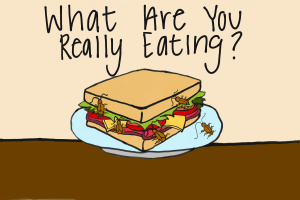Are you fueling bad?
Common vitamin deficiencies in teens that can be fixed with diet
Photo by Marg
Photo Illustration
March 4, 2020
Grabbing a bag of chips or a scoop of ice cream after school for the sake of “de-stressing” is something any high school student running on little sleep could probably admit to. However, relying on snacks full of sugar to satisfy an appetite is not a sustainable way to source energy to your body in the long run. From fatigue to heart disease, there are many negative side effects from a lack of proper nutrition.
As teens grow up in the age of technology, less and less time is spent outdoors.un A 2016 study by the Environmental Working Group showed that 98% of 14-18 year old’s diets lack the proper amount of vitamin D. This can cause a serious lack in the amount of vitamin D that the body receives. This deficiency does not only cause fatigue but also symptoms of depression. Other than symptoms present in the day to day, a lack of Vitamin D can cause weak bones overtime.
A leading cause of fatigue is iron deficiency. Along with feelings of exhaustion, people may feel uncommonly short of breath. For many teens, a diet of leafy greens is not one that sounds appealing, but other options exist to make sure you are getting the proper amount of iron. A healthy breakfast is something that will stimulate your metabolism and get your mind running. Before heading out for school, try an iron fortified breakfast cereal for a quick solution that will meet the proper amounts for suggested daily iron intake. Without considering proper iron intake, in the long run, your body is more vulnerable to infection.
If you suffer from numbness or tingling in the hands or feet, have difficulty walking or memory loss, you may lack vitamin B12.
If you choose a plant based diet, you may find yourself without proper amounts of B12. Eating meat can alleviate this deficiency.
While people may see the effects of their improper nutrition in the day to day, hidden outcomes of poor diets may appear much later in life. The National Research Council and Institute of Medicine found in 2013 that the United States is the unhealthiest developed country in the world. The leading cause of death in the United States is heart disease, something that both genetics and diet play a part in.
Popular American foods like doughnuts, french fries, baked goods or microwaved popcorn are all high in trans fat and saturated fat. Consuming saturated and trans fats raise your bad cholesterol and lower your good cholesterol levels, which heightening your chances of developing heart disease. By avoiding foods high in these unhealthy fats, you avoid promoting a deadly disease.
The food we intake fuels our bodies. If you put in low grade fuel to a car, it will not run as efficiently. Make sure you put good fuel into yours.

















